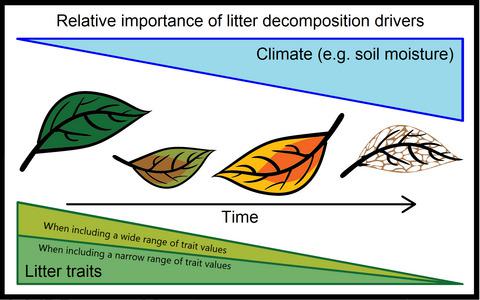Our official English website, www.x-mol.net, welcomes your
feedback! (Note: you will need to create a separate account there.)
Relative effects of climate and litter traits on decomposition change with time, climate and trait variability
Journal of Ecology ( IF 5.3 ) Pub Date : 2020-10-08 , DOI: 10.1111/1365-2745.13516 Rafaella Canessa 1 , Liesbeth Brink 2 , Alfredo Saldaña 3 , Rodrigo S. Rios 4, 5 , Stephan Hättenschwiler 6 , Carsten W. Mueller 7, 8 , Isabel Prater 7 , Katja Tielbörger 2 , Maaike Y. Bader 1
中文翻译:

气候和凋落物性状对分解的相对影响随时间,气候和性状的变化而变化
更新日期:2020-10-08
Journal of Ecology ( IF 5.3 ) Pub Date : 2020-10-08 , DOI: 10.1111/1365-2745.13516 Rafaella Canessa 1 , Liesbeth Brink 2 , Alfredo Saldaña 3 , Rodrigo S. Rios 4, 5 , Stephan Hättenschwiler 6 , Carsten W. Mueller 7, 8 , Isabel Prater 7 , Katja Tielbörger 2 , Maaike Y. Bader 1
Affiliation

|
- Climate and litter quality drive litter decomposition, but there is currently little consensus on their relative importance, likely because studies differ in the duration, the climatic gradients and variability in litter‐trait values. Understanding these drivers is important because they determine the direct and indirect (via vegetation composition) effects of climate change on decomposition and thereby on carbon and nutrient cycling.
- We studied how microclimate (soil moisture and temperature) and litter traits interactively affect litter mass loss, by using a reciprocal litter translocation experiment along a large climatic gradient in Chile. We followed decomposition for 2 years and used 30 plant species with a wide spectrum of functional‐trait values.
- Litter traits had a strong impact on litter decomposition across the gradient, while an increase in decomposition with soil moisture was observed only in the wettest climates. Overall, soil moisture increased considerably in importance, relative to trait effects, at later decomposition stages, from c. 15% of the importance of traits after 3 and 6 months to c. 110% after 24 months. Moreover, analysing subsets of the 30 species showed that trait effects on litter decomposition gained in importance when including a greater variation in trait values.
- Synthesis. The relative effects of litter traits and climate on decomposition depend on the ranges in climate and litter traits considered and change with time. Our study emphasizes the critical role of representative ranges in climate and functional trait values for understanding the drivers of litter decomposition and for improving predictions of climate‐change effects on this important ecosystem process.
中文翻译:

气候和凋落物性状对分解的相对影响随时间,气候和性状的变化而变化
- 气候和垫料质量推动垫料分解,但目前尚无共识,这可能是因为研究的持续时间,气候梯度和垫料特征值的变化存在差异。了解这些驱动因素很重要,因为它们确定了气候变化对分解以及碳和养分循环的直接和间接(通过植被组成)的影响。
- 我们使用智利沿大气候梯度的互易性垃圾转运试验,研究了小气候(土壤湿度和温度)和垃圾特性如何交互影响垃圾质量损失。我们进行了2年的分解,并使用了30种具有广泛功能特征值的植物。
- 凋落物性状对整个梯度上的凋落物分解有很大影响,而仅在最湿润的气候下,土壤水分的分解增加。总体而言,在后期分解阶段,相对于性状效应,土壤水分的重要性从c开始显着提高。3个月和6个月后,对c的性状重要性的15%。24个月后为110%。此外,分析30个物种的子集表明,当包括更大的性状值变异时,对凋落物分解的性状效应变得越来越重要。
- 综合。凋落物性状和气候对分解的相对影响取决于所考虑的气候和凋落物性状的范围,并随时间变化。我们的研究强调了代表性范围在气候和功能性状特征值方面的关键作用,以了解凋落物分解的驱动力并改善对这一重要生态系统过程的气候变化影响的预测。










































 京公网安备 11010802027423号
京公网安备 11010802027423号